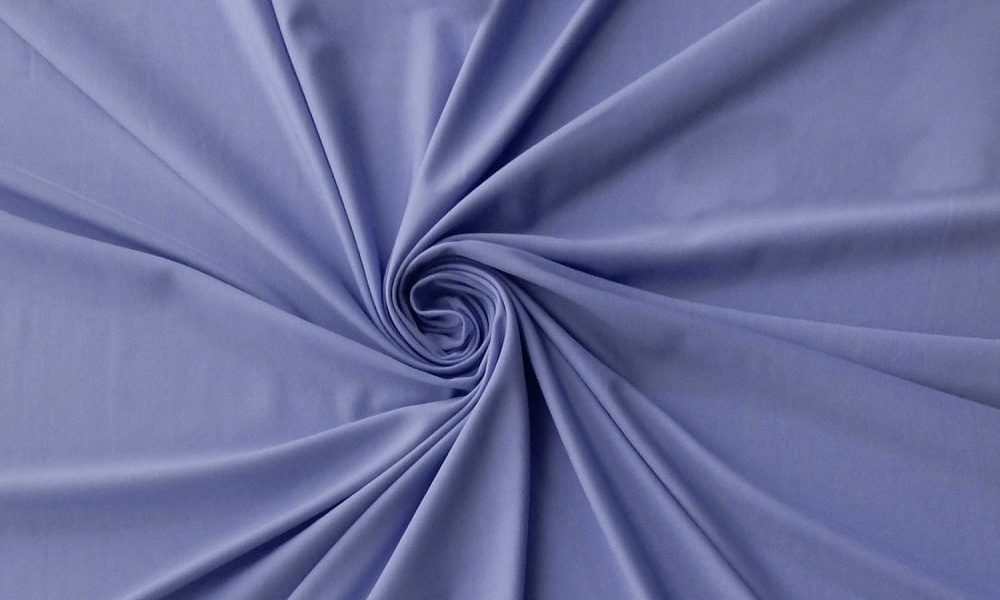
Eurojersey. Innovative fabrics Made in Italy
Interview with Andrea Crespi – Managing Director Eurojersey S.p.a.
 EUROJERSEY – An important Italian textile company founded in 1960, based in Caronno Pertusella, in the Province of Varese, Italy, Eurojersey – part of the Carvico Group – produces warp-knitted fabrics under the Sensitive® Fabrics brand for the sports, apparel, underwear, and swimwear sectors. With a 2022 turnover of 90 million euros, more than 250 employees, and a production cycle (weaving, dyeing, and printing) that takes place entirely in Italy, Eurojersey represents the pinnacle of international textile Made in Italy.
EUROJERSEY – An important Italian textile company founded in 1960, based in Caronno Pertusella, in the Province of Varese, Italy, Eurojersey – part of the Carvico Group – produces warp-knitted fabrics under the Sensitive® Fabrics brand for the sports, apparel, underwear, and swimwear sectors. With a 2022 turnover of 90 million euros, more than 250 employees, and a production cycle (weaving, dyeing, and printing) that takes place entirely in Italy, Eurojersey represents the pinnacle of international textile Made in Italy.
Eurojersey manufactures and sells worldwide the Sensitive® Fabrics range of performance and sustainable fabrics with cutting-edge features in terms of strength, protection, breathability and comfort. What are the key technical features of Eurojersey’s fabrics and what are the most innovative products you have launched in recent years on the market?
We have a range of patented and trademarked fabrics with a high level of quality related to the method of manufacture, namely the combination of innovative nylon fibers with elastomer.
I believe that the key to Eurojersey’s success should be sought first and foremost in its ability to keep up with market demands, expanding its offer – once focused on underwear and swimwear – to other sectors such as apparel and sportswear, sectors in which the demand for stretch, comfortable and durable fabrics has grown enormously – in recent years.
The combination of elegance, comfort and functionality represents the essence of our fabrics.
Eurojersey has been successfully operating for over sixty years and counts among its customers many major brands in the world of sports, apparel, underwear, and swimwear. How has the industry evolved in recent years and how have market demands changed?
Eurojersey has always been among the leading companies in the production of technical stretch and ladderproof fabrics, and the demand for this type of fabric, as I mentioned, has literally exploded in recent years, and it is a phenomenon that we all experience and observe in our daily lives.
For running or hiking, people today want stretch pants that are both comfortable and aesthetically pleasing. But that’s not all: even those who go to work walking, using a bicycle or scooter want multi-tasking, multi-purpose garments with multiple functions of use, capable of combining sophistication with comfort. And the concept of elegance itself has changed over the years and is moving in the direction of more functionality and sportiness.
The trend for us is absolutely positive, and Eurojersey’s ability to ride all these new trends is allowing us to grow year on year with percentages above 20 percent.
Among the most recent proposals presented by Eurojersey, the Flash Art capsule of Sensitive® Fabrics, born from the collaboration with FAI – Fondo per l’Ambiente Italiano, is certainly interesting. Can you tell us about this project and other original ideas coming soon?
All the collaborations that Eurojersey carries out with important realities belonging to non-textile worlds always go in the same direction: the enhancement – by a proudly Italian textile company like ours – of Italian beauty and of the great artistic, landscape and cultural heritage that our country can boast. The collaboration with FAI, which we are going to further consolidate in the coming years, also responds to this attempt to create virtuous synergies between different worlds but united by a passion for Made in Italy.
Between Covid, international geopolitical difficulties, rising logistics and transportation costs, global supply chain crises and energy shocks, the past few years certainly have not been easy for textile companies. What is the situation like today? How might it evolve in the coming years? And what will this complex period bequeath to the textile world – for better or worse?
The world is changing rapidly, and it is crucial for a company to look ahead and seize the opportunities that this complex historical phase is opening up.
Quality of work and corporate welfare are now elements that entrepreneurs and managers can no longer neglect, and Covid – from this point of view – has accelerated and boosted demands in this regard from workers. In Eurojersey we have hired a Welfare Manager and we try – in a smart working perspective, and where possible – to find a balance between working in the presence and working from home. In this sense, however, Covid, a dramatic phenomenon in terms of its health impact and overall economic consequences, has fostered the spread of a more ethical and humane approach to work.
As for the global supply chain crisis and the energy shock, on the other hand: a process of reshoring textile production in Italy and Europe is underway, a process that was first fostered by the difficulties related to intercontinental transportation during the Covid period and was later curbed-but not blocked-by the increase in energy costs for European companies. I believe, however, that there is a much broader and deeper issue at stake than simple evaluations related to higher or lower logistics and transportation costs: the real problem, from a long-term perspective, has to do with the environmental unsustainability of excessively long and arduous textile supply chains. If we think in terms of eco-sustainability, does it make sense to make a T-shirt go twice around the world and then be sold for 4 euros? Evidently not.
Having said that, it is always important to be optimistic but also realistic: the reshoring of textile production in Europe has been going on for three years and will continue, but it is clear that – to limit ourselves to the Italian example – if our country has lost about 70 percent of its textile production in recent decades, it is unthinkable that it can suddenly return to the manufacturing levels of fifty years ago within a few years. Instead, it is possible that at this juncture there could be a return to Italy of 10 to 15 percent of the textile production we had lost, and this is no small thing and certainly represents a great opportunity for Made in Italy.
ITA
Eurojersey. Tessuti innovativi Made in Italy
Intervista a Andrea Crespi – Managing Director Eurojersey S.p.a.
EUROJERSEY – Importante azienda tessile italiana fondata nel 1960, con sede a Caronno Pertusella, in Provincia di Varese, Eurojersey – che fa parte del Gruppo Carvico – produce tessuti indemagliabili con il marchio Sensitive® Fabrics per i settori sport, abbigliamento, intimo, costumi da bagno. Con un fatturato del 2022 pari a 90 milioni di euro, più di 250 dipendenti e un ciclo produttivo (tessitura, tintoria e stamperia) che si svolge interamente in Italia, Eurojersey rappresenta il vertice del Made in Italy tessile internazionale.
Eurojersey produce e vende in tutto il mondo la gamma di tessuti Sensitive® Fabrics, prodotti performanti e sostenibili con caratteristiche all’avanguardia dal punto di vista della resistenza, della protezione, della traspirabilità e del comfort. Quali sono le peculiarità tecniche fondamentali dei tessuti di Eurojersey e quali sono i prodotti maggiormente innovativi che avete lanciato negli ultimi anni sul mercato?
Abbiamo una gamma di tessuti brevettata e dal marchio registrato, con un alto livello qualitativo legato al metodo di manifattura, ovvero all’unione di fibre innovative in nylon con elastomero.
Credo che la chiave del successo di Eurojersey si debba cercare innanzitutto nella capacità di stare al passo con le richieste del mercato, ampliando l’offerta – un tempo focalizzata sull’intimo e sui costumi da bagno – anche ad altri settori come l’abbigliamento e l’abbigliamento sportivo, settori nei quali è cresciuta enormemente – negli ultimi anni – la domanda di tessuti elasticizzati, confortevoli e durevoli.
L’unione tra eleganza, confort e funzionalità rappresenta l’essenza dei nostri tessuti.
Eurojersey è presente con successo da oltre sessant’anni e annovera tra i propri clienti molti tra i maggiori brand nel mondo dello sport, abbigliamento, intimo e dei costumi da bagno. Come si è evoluto il settore negli ultimi anni e in che modo sono cambiate le richieste del mercato?
Eurojersey è da sempre tra le aziende leader nella produzione di tessuti tecnici elasticizzati e indemagliabili, e la domanda relativa a questa tipologia di tessuti, come dicevo, è letteralmente esplosa negli ultimi anni, ed è un fenomeno che viviamo e osserviamo tutti nella quotidianità.
Per andare a correre o per fare trekking le persone vogliono oggi dei pantaloni elasticizzati, al tempo stesso comodi ed esteticamente apprezzabili. Ma non solo: anche chi va al lavoro camminando, usando la bicicletta o il monopattino vuole dei capi multitasking, polivalenti, con più funzioni d’uso, in grado di unire la raffinatezza al confort. E lo stesso concetto di eleganza è cambiato negli anni e va nella direzione di una maggiore funzionalità e sportività.
Il trend per noi è assolutamente positivo, e la capacità di Eurojersey di cavalcare tutte queste nuove tendenze ci sta consentendo di crescere anno su anno con percentuali superiori al 20%.
Tra le proposte più recenti presentate da Eurojersey è sicuramente interessante la capsule Flash Art dei tessuti Sensitive® Fabrics, nata dalla collaborazione con il FAI – Fondo per l’Ambiente Italiano. Può parlarci di questo progetto e di altre idee originali in arrivo prossimamente?
Tutte le collaborazioni che Eurojersey porta avanti con importanti realtà appartenenti a mondi extra-tessili vanno sempre nella stessa direzione: la valorizzazione – da parte di un’azienda tessile orgogliosamente italiana come la nostra – della bellezza italiana e del grande patrimonio artistico, paesaggistico e culturale che può vantare il nostro Paese. Anche la collaborazione con il FAI, che andremo ulteriormente a consolidare nei prossimi anni, risponde a questo tentativo di creare sinergie virtuose tra mondi diversi ma accomunati dalla passione per il Made in Italy.
Tra Covid, difficoltà geopolitiche internazionali, aumento dei costi di logistica e trasporti, crisi delle supply chain globali e shock energetico, gli ultimi anni certamente non sono stati facili per le aziende tessili. Com’è oggi la situazione? Come potrebbe evolversi nei prossimi anni? E cosa lascerà in eredità al mondo tessile – nel bene e nel male – questo periodo così complesso?
Il mondo sta cambiando rapidamente ed è fondamentale, per un’azienda, guardare avanti e cogliere le opportunità che questa fase storica complessa sta dischiudendo.
La qualità del lavoro e il benessere aziendale sono oggi degli elementi che gli imprenditori e i manager non possono più trascurare, e il Covid – da questo punto di vista – ha accelerato e potenziato le richieste in tal senso da parte dei lavoratori. In Eurojersey abbiamo assunto un Welfare Manager e cerchiamo – in un’ottica di smart working, e laddove è possibile – di trovare un equilibrio tra il lavoro in presenza e il lavoro da casa. In questo senso il Covid, fenomeno drammatico dal punto di vista dell’impatto sanitario e per quanto riguarda le conseguenze economiche complessive, ha però favorito il diffondersi di un approccio al lavoro più etico e più umano.
Per quanto concerne invece la crisi delle supply chain globali e lo shock energetico: è in atto un processo di reshoring delle produzioni tessili in Italia e in Europa, processo che è stato dapprima favorito dalle difficoltà legate ai trasporti intercontinentali nel periodo del Covid e che è stato in seguito frenato – ma non bloccato – dall’incremento dei costi energetici per le aziende europee. Credo comunque che sia in gioco una questione molto più ampia e profonda delle semplici valutazioni connesse ai maggiori o minori costi della logistica e dei trasporti: il vero problema, in un’ottica di lungo termine, ha a che fare con la insostenibilità ambientale di filiere tessili troppo lunghe e arzigogolate. Se ragioniamo in termini di ecosostenibilità ha senso ha senso far fare due volte il giro del mondo a una maglietta che poi viene venduta a 4 euro? Evidentemente no.
Detto questo, è sempre importante essere ottimisti ma anche realisti: il reshoring delle produzioni tessili in Europa è in corso da tre anni e continuerà, ma è chiaro che – per limitarsi all’esempio italiano – se il nostro Paese ha perso negli ultimi decenni il 70% circa della produzione tessile, non è pensabile che possa nel giro di pochi anni tornare all’improvviso ai livelli manifatturieri di cinquant’anni fa. È possibile invece che in questo frangente possa esserci il ritorno in Italia di un 10 / 15% della produzione tessile che avevamo perso, e questo non è poco e rappresenta sicuramente una grande opportunità per il Made in Italy.

